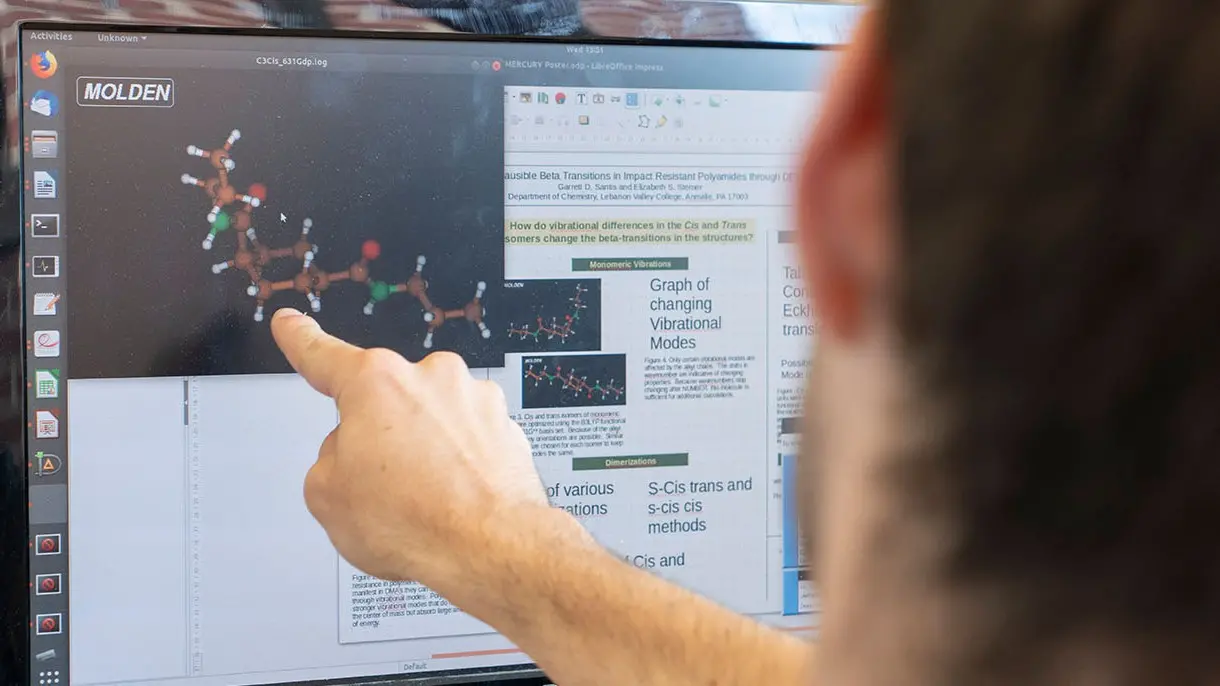
Chemistry Mission, Goals, & Objectives
The guiding educational principle in the chemistry department is a simple one: engaged students learn. Through an ambitious undergraduate research program, a fresh emphasis on internships, and a problem-based pedagogy, we seek to immerse our students in the doing of science as we help them develop a solid foundation in modern chemistry. In the classroom, in laboratory courses, and through relevant research experiences, our students will build a fundamental knowledge of chemistry and a working understanding of the process of scientific investigation.
Our students will use their knowledge to solve problems of increasing sophistication, often employing the state-of-the-art technology that underlies modern chemical investigation. Our students will be able to critically evaluate scientific information and communicate such information, clearly and effectively, to scientists and nonscientists alike. With this foundation our graduates will compete at the bachelor’s degree level for prime entry-level positions in industry, government, and teaching, and will enter and successfully complete post-graduate degree programs at leading institutions nationwide.
Chemistry Department Goals and Objectives
Program Goal 1: Graduates from our program will possess a strong foundational knowledge of modern inorganic, organic, analytical, physical, and biological chemistry.
- Structure of Matter and its Transformations – Students will describe the structure of matter and of its physical and chemical transformations using appropriate scientific theories and reasoning.
- Theoretical Frameworks to Model, Understand, and Predict – Students will predict chemical structure, reactivity, and physical properties using appropriate theories.
- Comprehensive Skills & Knowledge – Students will demonstrate comprehensive knowledge of chemical concepts and theories across the foundational subdisciplines of chemistry.
Program Goal 2: Graduates from our program will be proficient in modern laboratory methods, technological tools, and proper safety practice to the studies of chemical systems.
- Theory of Lab Techniques – Students will explain the theoretical bases, operating principles, and experimental uses of standard laboratory techniques and analyses, scientific instrumentation, and software applications.
- Safety – Students will recognize hazards, assess and minimize risks, and plan for emergencies.
- Laboratory Techniques, Synthesis, Instrumentation and Characterization – Students will perform quantitative analysis, chemical synthesis, characterization of compounds, and measurement of chemical reactivity using standard laboratory techniques.
Program Goal 3: Graduates from our program will be skilled in the methods of scientific investigation.
- Experimental Design, Hypothesis Testing, and Controls – Students will formulate testable hypotheses and design appropriately controlled experiments to test those hypotheses.
- Collect, Analyze, and Interpret Experimental Data – Students will collect, analyze, and evaluate experimental data.
Program Goal 4: Graduates from our program will be able to think as chemists, critically evaluating scientific information and solving scientific problems, as a means of testing and strengthening their developing knowledge.
- Activities Requiring Analysis, Synthesis, and Evaluation – Students will solve problems using analysis, synthesis, and evaluation .
- Search, Access and Critique Scientific Literature – Students will access, search, evaluate, and critique the primary scientific literature.
Program Goal 5 – Graduates from our program will embody the highest professional standards of the discipline.
- Communication of Scientific Information – Students will organize, evaluate, summarize, and communicate experimental data and scientific concepts in both written and oral formats.
- Collaboration in Diverse Groups – Students will respectfully and competently work in groups with diverse experiences, cultures, identities, and abilities.
- Ethical Behavior – Students will demonstrate ethical behavior in accordance with the highest standards of the chemistry profession.
A table showing the courses and research activities in which these objectives are to be achieved is provided in the curriculum map for the department of chemistry.
For more information on learning goals and outcomes, contact institutionalresearch@lvc.edu.


